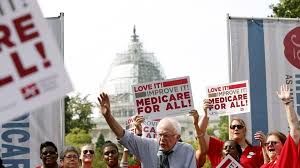The first step towards universal health care was by German in 1883 where employers were forced to provide injury and illness insurance to workers funded by deductions from employees wages and employer contributions. The first real universal health care system was established in New Zealand in 1941. After World War II, began to be set up by the United Kingdom, Nordic Countries and Japan. Subsequently, other countries around the world began to establish universal health care systems. It emerged as a major political point in American politics with the election of Barack Obama, who campaigned on health care reform in America. During his administration he passed the Affordable Health Act in 2010. During the 2016 election, Bernie Sanders’ platform heavily emphasized a single-payer health care system in America while Donald Trump’s platform emphasized the repeal of Obamacare (ACA). Universal healthcare is defined by three different categories: (1) who is covered, (2) what services are covered, and (3) how much of the cost is covered. The World Health organization defines it as a situation where citizens have access to all health services without experiencing financial hardships.
On social media, Demand Universal Healthcare has amassed over 80,000 followers on Facebook and 15,000 followers on Twitter. Social media has proved to bo their major avenue for advocacy, there they can provide public education and raise awareness for the movement. DUH has taken three tours across the United States to promote 'The Healthcare Movie' that narrates the differences in the Canadian and American health care systems. Some of these screenings proved to be massively successful with large amounts of people showing up, while others failed in attracting attention. DUH planned two rallies at the National Mall in Washington DC. The Drive for Universal Healthcare rally in 2013 was canceled due to lack of support from the public and th lack of funds. their 2015 Healthcare Justice March attracted a small crowd of almost 300 people with speakers, like Jill Stein, and musical acts. No more rallies or tours have been planned due to the lack of funds, that come from public donations. Their website provides more in depth information about universal healthcare though fact sheets and easy access to the bills introduced in Congress. The Democratic Socialists of America,another groups passionate about achieving universal healthcare, has a much larger following with 181 local chapters in 49 states and approximately 35,000 members. This has allowed them to hold regular meetings in each chapter to educate the public and their members. Large chapters allow for a higher degree of social activism on a local level with local governments.
Although universal healthcare has not yet been achieved in America, there have been some successes in the fight for universal healthcare. The passage of Social Security in 1935 was a great success in expanding healthcare to those that were unemployed. It succeed in sets up a foundation of economic security for millions of Americans, including retirees, disabled persons, and families of retired, disabled or deceased workers. The Social Security program has been amended many times, to expand its coverage or reduce it, although this is done rarely because it is costly to politicians seeking reelection. The Affordable Care Act passed under the administration, which aimed to provide healthcare insurance plans to the nearly 48 million uninsured Americans for a much cheaper price by the United States government than what could be obtained through private insurers. ACA succeeded in reducing the amount of uninsured people in America down to 28 million. Another success was the prevention of the repeal of ACA, especially during the Trump Presidency. In a Republican controlled Congress and Presidency, attempts at universal healthcare will likely not pass since the run their campaigns on keeping healthcare private. However, it seems as if more people, at least on the left side of the ideological spectrum, are increasingly supporting a healthcare reform in America that would achieve universal healthcare.

